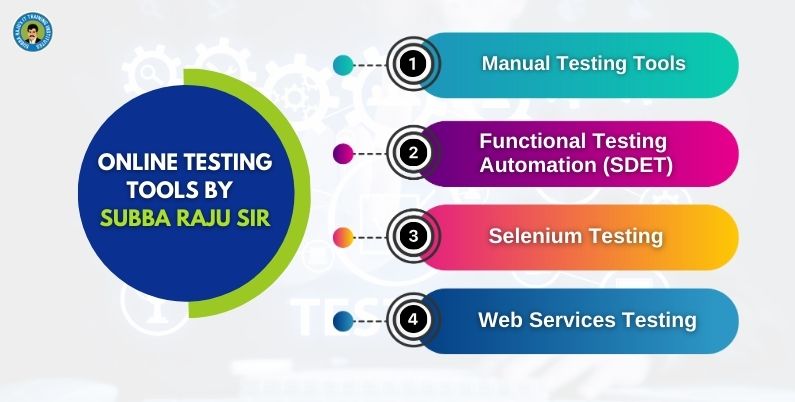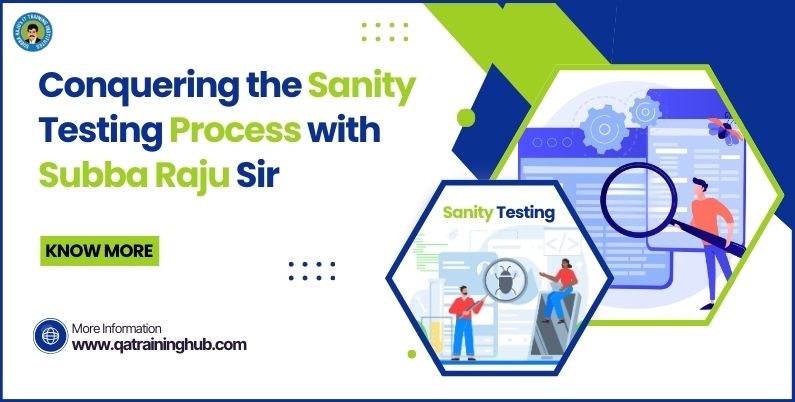
Key Features of Online Testing Solutions in Hyderabad for 2024.
Why QA Training Hub Testing Tools Course in Hyderabad?.
Testing Tools by QA Training Hub Course in Hyderabad.
Explore the Best Online Testing Solutions in Hyderabad for 2024
Are you passionate about quality and want to ensure software applications function flawlessly? Look no further than QA Training Hub’s Testing Tools Course. This comprehensive program equips aspiring and seasoned testers with the necessary skills and knowledge to excel in the dynamic world of software testing. Explore the Best Online Testing Solutions in Hyderabad for 2024, the Testing Tools Course covers a wide range of topics, providing a well-rounded foundation in software testing methodologies and tools.
Key Features of Online Testing Solutions in Hyderabad for 2024
- Fundamentals of Software Testing: Grasp core concepts of testing principles, the Software Development Life Cycle (SDLC), and testing methodologies like black-box and white-box testing.
- Manual Testing Techniques: Master the art of manual testing, learning test case design, defect management, and bug reporting strategies.
- Automation Testing Tools: Uncover the power of automation with in-depth exploration of popular testing tools like Selenium WebDriver, Appium, and more.
- API Testing: Dive into the realm of API testing, understanding how to test application programming interfaces for functionality and performance.
- Performance Testing: Learn how to analyze software performance under load, ensuring responsiveness and scalability.
- Database Testing: Explore techniques for verifying the integrity and functionality of database systems.
Why QA Training Hub Testing Tools Course in Hyderabad?
- Industry-Relevant Curriculum: Focuses on the latest testing tools and methodologies used by professionals.
- Experienced Instructors: Learn from seasoned QA professionals with proven expertise in the field.
- Hands-on Learning: Gain practical experience through real-world projects and exercises.
- Flexible Learning Options: Choose between classroom, online, or corporate training formats.
- Career Support: Get access to guidance and resources to help you land your dream job in software testing.
Testing Tools by QA Training Hub Course in Hyderabad
The world of software testing demands a diverse arsenal of tools to address various functionalities and applications. QA Training Hub’s courses delve into a variety of these tools, empowering you to become a well-equipped tester. Here’s a glimpse into some prominent categories:

Manual Testing Tools:
Manual Testing Tools are software applications designed to assist testers in executing and managing test cases without automation. Unlike automated testing tools that use scripts to perform tests, manual testing tools support the manual execution of test cases, recording results, and managing test processes.
Importance of Manual Testing Tools
- Comprehensive Test Coverage: Manual testing tools allow testers to explore the application’s user interface and functionality thoroughly, ensuring that every aspect of the software is evaluated.
- Usability and User Experience Testing: These tools help in assessing the application’s usability and overall user experience, which automated tests might overlook. Manual testing is crucial for identifying usability issues and ensuring a seamless user experience.
- Flexibility and Adaptability: Manual testing tools provide flexibility in executing test cases and adapting to changes in requirements or application behavior. They are useful for exploratory testing and handling complex scenarios that are difficult to automate.
- Cost-Effective for Small Projects: For smaller projects or applications with frequently changing requirements, manual testing can be more cost-effective than investing in automation tools and scripts.
Functional Testing Automation (SDET)
A Software Development Engineer in Test (SDET) is a specialized role that combines software development skills with a deep understanding of testing principles.
SDETs are integral to functional testing automation for several reasons:
- Development of Test Automation Frameworks: SDETs design and develop robust test automation frameworks that support various testing needs. These frameworks are essential for executing automated test cases efficiently.
- Writing and Maintaining Test Scripts: SDETs write and maintain test scripts that automate functional test cases. Their expertise ensures that these scripts are effective in detecting issues and verifying application functionality.
- Integration with CI/CD Pipelines: SDETs integrate automated tests into Continuous Integration/Continuous Deployment (CI/CD) pipelines, enabling automated testing as part of the software development lifecycle. This integration helps in catching defects early and accelerating the release process.
- Collaboration with Development Teams: SDETs work closely with developers to understand the application’s functionality and requirements. This collaboration ensures that the test automation aligns with the development goals and provides valuable feedback for continuous improvement.
- Test Data Management: Effective test automation requires well-managed test data. SDETs develop strategies for generating and managing test data to ensure that automated tests cover all scenarios.
- Performance Monitoring and Reporting: SDETs monitor the performance of automated tests and generate detailed reports. These reports provide insights into the application’s functionality and help in identifying areas that need attention.
Selenium Testing:
Selenium is an open-source framework designed for automating web applications. It allows testers to write scripts in various programming languages to interact with web elements and validate functionality. Selenium supports multiple browsers such as Chrome, Firefox, and Safari, and can be used on different operating systems, including Windows, macOS, and Linux.
Benefits of Selenium Testing
- Cross-Browser Compatibility: Selenium supports various browsers, allowing you to test your application’s functionality across different environments and ensuring a consistent user experience.
- Language Flexibility: Selenium supports multiple programming languages, enabling testers to use the language they are most comfortable with or that aligns with their development environment.
- Integration with Other Tools: Selenium integrates seamlessly with other tools and frameworks, such as TestNG, JUnit, Jenkins, and Maven, to support continuous integration and continuous deployment (CI/CD) processes.
- Open-Source and Community Support: Being open-source, Selenium is freely available and backed by a robust community. This results in continuous improvements, extensive documentation, and a wealth of resources for troubleshooting and support.
- Parallel Test Execution: With Selenium Grid, you can run tests in parallel across different browsers and operating systems, significantly reducing the time required for test execution.
Web Services Testing:
Web Services Testing involves validating the functionality, performance, and reliability of web services. Web services are standardized methods for communication between different software applications over the web, typically using protocols such as HTTP, SOAP (Simple Object Access Protocol), or REST (Representational State Transfer).
Importance of Web Services Testing
- Ensure Functionality: Verifying that web services perform their intended functions correctly is critical for the overall application’s operation. Functional testing ensures that services return the expected results and handle various inputs properly.
- Validate Performance: Performance testing assesses how well web services handle load and stress. Ensuring that services respond quickly and efficiently under different conditions helps in maintaining application performance and user satisfaction.
- Verify Security: Security testing is essential to identify vulnerabilities and ensure that web services are protected against threats and unauthorized access. This includes validating authentication, authorization, and data encryption.
- Check Interoperability: Web services often need to interact with other systems and services. Interoperability testing ensures that services work seamlessly with different clients and systems, regardless of their platform or technology.
- Confirm Compliance: Ensuring that web services adhere to industry standards and regulations is important for legal and operational compliance.
Conclusion
In the vibrant tech landscape of Hyderabad, the demand for advanced and effective testing tools is ever-growing. QA Training Hub stands out as a pivotal resource for professionals seeking to master these tools and enhance their testing skills. By providing comprehensive training on a range of cutting-edge testing tools and Explore the Best Online Testing Solutions in Hyderabad for 2024. QA Training Hub equips individuals and organizations with the expertise needed to ensure software quality and reliability. From functional and performance testing to security and automation, the tools covered in QA Training Hub’s programs are essential for navigating the complexities of modern software development. The hands-on experience and in-depth knowledge gained through these training programs not only bolster professional capabilities but also contribute to the overall excellence of software products.
Explore the Best Online Testing Solutions in Hyderabad for 2024 with the tech industry in Hyderabad continues to evolve, staying abreast of the latest testing tools and methodologies is crucial. QA Training Hub’s commitment to delivering top-notch education and training ensures that professionals are well-prepared to tackle the challenges of software testing and drive innovation in their fields.
FAQ’s
- What are QA testing tools in Hyderabad?
QA testing tools in Hyderabad are software applications used to ensure the quality and functionality of software by automating tests, managing test cases, and tracking defects.
- Why are QA testing tools important for software development in Hyderabad?
QA testing tools are crucial for identifying bugs and issues early in the development process, improving software quality, ensuring that applications meet user requirements, and facilitating efficient test management.
- What types of QA testing tools are available in Hyderabad?
In Hyderabad, you can find various types of QA testing tools, including:
- Manual Testing Tools: For managing and executing test cases manually (e.g., JIRA, TestRail).
- Automation Testing Tools: For automating repetitive test cases (e.g., Selenium, QTP).
- Performance Testing Tools: For assessing application performance under load (e.g., JMeter, LoadRunner).
- Security Testing Tools: For identifying vulnerabilities (e.g., OWASP ZAP, Burp Suite).
- How can I choose the right QA testing tool for my project?
Choose a QA testing tool based on factors such as your project’s requirements, the type of testing needed, compatibility with your technology stack, ease of use, and budget.
- Are there training resources available for QA testing tools in Hyderabad?
Yes, several training centers and institutes in Hyderabad offer courses and workshops on QA testing tools.
- How can QA Training Hub in Hyderabad help with QA testing tools?
QA Training Hub offers expert training on a range of QA testing tools, providing hands-on experience and in-depth knowledge. Their programs cover both fundamental and advanced testing techniques, helping individuals and teams enhance their testing skills and improve software quality.
- Can QA testing tools be integrated with other development tools?
Yes, many QA testing tools support integration with other development and project management tools, such as JIRA, Jenkins, and Git.
- What are the benefits of using automated testing tools in Hyderabad?
Automated testing tools offer benefits such as faster test execution, increased test coverage, repeatability of tests, and early detection of defects.
- Are there free or open-source QA testing tools available?
Yes, there are several free and open-source QA testing tools available, such as Selenium for automation testing, JMeter for performance testing, and OWASP ZAP for security testing.
- How can I stay updated with the latest QA testing tools and trends?
To stay updated, follow industry blogs, attend webinars and conferences, participate in online forums, and join professional groups related to QA testing. QA Training Hub and similar institutions often provide updates and insights into the latest tools and best practices.







